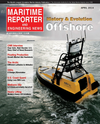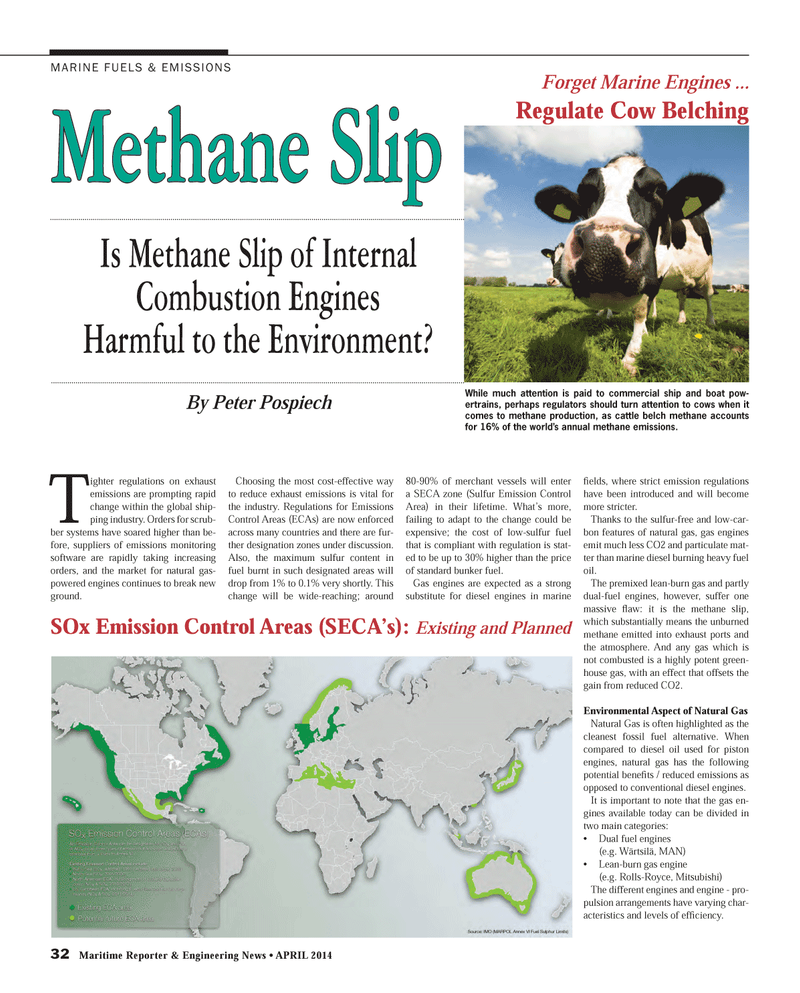
Page 32: of Maritime Reporter Magazine (April 2014)
Offshore Edition
Read this page in Pdf, Flash or Html5 edition of April 2014 Maritime Reporter Magazine
32 Maritime Reporter & Engineering News ? APRIL 2014 MARINE FUELS & EMISSIONSTighter regulations on exhaust emissions are prompting rapid change within the global ship-ping industry. Orders for scrub- ber systems have soared higher than be-fore, suppliers of emissions monitoring software are rapidly taking increasing orders, and the market for natural gas-powered engines continues to break new ground.Choosing the most cost-effective way to reduce exhaust emissions is vital for the industry. Regulations for Emissions Control Areas (ECAs) are now enforced across many countries and there are fur- ther designation zones under discussion. Also, the maximum sulfur content in fuel burnt in such designated areas will drop from 1% to 0.1% very shortly. This change will be wide-reaching; around 80-90% of merchant vessels will enter a SECA zone (Sulfur Emission Control Area) in their lifetime. What?s more, failing to adapt to the change could be expensive; the cost of low-sulfur fuel that is compliant with regulation is stat-ed to be up to 30% higher than the price of standard bunker fuel.Gas engines are expected as a strong substitute for diesel engines in marine Þ elds, where strict emission regulations have been introduced and will become more stricter. Thanks to the sulfur-free and low-car- bon features of natural gas, gas engines emit much less CO2 and particulate mat-ter than marine diesel burning heavy fuel oil. The premixed lean-burn gas and partly dual-fuel engines, however, suffer one massive ß aw: it is the methane slip, which substantially means the unburned methane emitted into exhaust ports and the atmosphere. And any gas which is not combusted is a highly potent green-house gas, with an effect that offsets the gain from reduced CO2.Environmental Aspect of Natural Gas Natural Gas is often highlighted as the cleanest fossil fuel alternative. When compared to diesel oil used for piston engines, natural gas has the following potential beneÞ ts / reduced emissions as opposed to conventional diesel engines. It is important to note that the gas en-gines available today can be divided in two main categories:? Dual fuel engines (e.g. Wärtsilä, MAN) ? Lean-burn gas engine (e.g. Rolls-Royce, Mitsubishi) The different engines and engine - pro- pulsion arrangements have varying char- acteristics and levels of efÞ ciency. Methane Slip Methane Slip Is Methane Slip of Internal Combustion Engines Harmful to the Environment?By Peter PospiechWhile much attention is paid to commercial ship and boat pow- ertrains, perhaps regulators should turn attention to cows when it comes to methane production, as cattle belch methane accounts for 16% of the world?s annual methane emissions. SOx Emission Control Areas (SECA?s): Existing and PlannedForget Marine Engines ... Regulate Cow BelchingMR #4 (26-33).indd 32MR #4 (26-33).indd 324/4/2014 10:51:57 AM4/4/2014 10:51:57 AM

 31
31

 33
33
